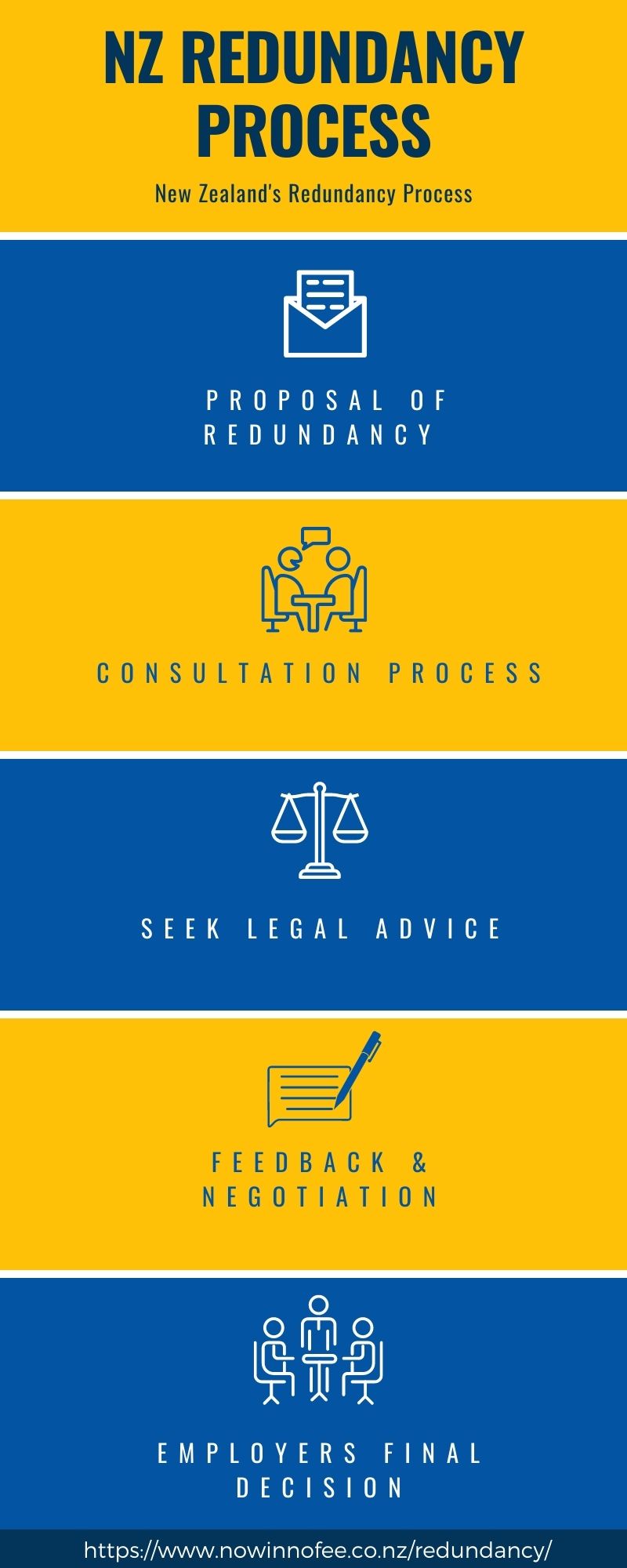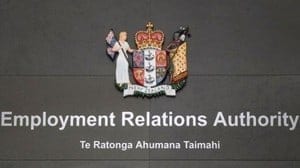Is your employer making you redundant?
If you have been made redundant, and you feel the process was not fair or that the redundancy was not genuine, you must raise a personal grievance within 90 days. If you don’t your employer doesn’t have to do anything about your complaint.
There should be a genuine reason.
Sometimes employers use ‘Redundancy’ to dismiss staff when they don’t have grounds for dismissal.
If your employer is facing hardship they must enter into a consultation process where you are told your position could be made redundant and given the chance to provide feedback. You can counter the proposal with your own suggestions such as taking a pay cut, leave without pay or changing the role to include other work.
If your employer says the business is struggling and if you are the only person who is facing the redundancy process then it may not be genuine. Your employer can’t employ a new person to do the same job as you, but they may be able to combine two jobs. They can’t make you redundant and then advertise for someone to fill your role.
It is a genuine redundancy if a person’s employment has been ended because their employer has decided, for ‘genuine reasons’ that the employee’s job is no longer needed. A ‘genuine reason’ could, for example, be that the employer is making changes to enable the business to operate more efficiently and cost-effectively; or closing down or selling the business.
Minor alterations to a job’s role and responsibilities should not be a reason for redundancy.
Check your Employment Agreement
What does it say about redundancy in your Employment Contract? You should always make sure you are familiar with the terms of the employment agreement. This will usually have specific provisions dealing with the redundancy process and any entitlements.
Redundancy Payments
Under New Zealand law it is not compulsory for an Employer to pay redundancy compensation. Check Your Employment Agreement:
If your employment agreement mentions redundancy compensation, it will probably also show what the amount of compensation will be. If there is no mention of the amount it could be up for negotiation.
Notice of redundancy
If there is no specific clause in an employment agreement giving a period of notice in a redundancy situation, ‘reasonable notice’ must be given. The length of ‘reasonable notice’ depends on a variety of factors, such as:
- the reason for the redundancy
- the employee’s length of service
- the employee’s seniority and/or remuneration package
- custom, practice and industry norms
- the employee’s ability to find alternative employment
- the amount of compensation being paid (if any).
A ‘reasonable’ notice period is usually two weeks to a month.
The decision must be about the position and must not be about an individual employee personally. The employer cannot use redundancy as a means of getting rid of under-performing employees or disciplining employees for misconduct.
New Zealand’s Redundancy Process

When can a person be made redundant?
- The position must be superfluous to the employer’s needs.
For example, where a larger number of employees are employed than necessary to operate the business efficiently, certain positions may be disestablished. - The position must actually disappear. The employer cannot claim redundancy by changing a job description slightly or employing new employees to undertake the same or a similar position.
- The business is closing down
What is the process for making a person redundant?
Your employer must follow the proper process when they need to make you redundant.
Restructuring or redundancy must be carried out in good faith and your employer must not mislead or deceive you.
Your employer must;
- Give you written notice of a discussion/meeting. The letter should say that the meeting is to discuss redundancy or restructuring ;
- tell you the reasons for the proposed changes, and how they will affect your job;
- consult with you and anyone else who may be made redundant;
- give you a chance to get independent advice, and to have a representative or support person with you when you attend the meeting to discuss your possible redundancy or restructure;
- consider your suggestions before they make any decision about their proposed changes; and
- consider alternatives to making you redundant e.g. giving you a job elsewhere in the company or reducing the hours you work.
If the redundancy is false and amounts to an unfair dismissal we can pursue a grievance on your behalf.
We can help you with all aspects of redundancy.
It’s free to discuss your situation with us.
What does redundancy mean?
To be made redundant from your job position means that your position is no longer needed in the company. Redundancy is a type of dismissal. This may be due to a company re-structure or shifts in the economy or job industry.
What am I entitled to?
Throughout the redundancy process as an employee, you are entitled to seek legal advice, negotiate and provide feedback to the employer.
It is important that you have read and fully understood your employment agreement. Your notice period will be outlined in this agreement along with information regarding final pays. Generally, an employee will be paid our their annual leave once the redundancy has been finalised.
What is the redundancy process?
Your employer must notify you in writing that your position may be up for redundancy. You should be supplied with a letter/notice of redundancy that asks you to attend a meeting with your employer.
The employer must explain the situation to you and give you adequate time to process the news, seek legal advice and provide feedback. Feedback can be where the employee offers a reduction in hours, pay or other factors of your role. Although this may not save your job, it is a good chance to negotiate your redundancy in the case these offers change anything on the employers’ end.
Once you (the employee) has had the opportunity to provide feedback and seek legal advice the decision now sits with the employer. You will receive confirmation of your redundancy and you will start working out your notice period (check your employment agreement).
CONTACT US FOR A FREE CASE EVALUATION
You can trust us to listen
Statistics prove that legal representation for employees by an employment lawyer or employment law advocate improves your chance of a successful outcome.
You have nothing to lose by having a free consultation with an Employment Law Advocate.
You can email us using the form below. When you receive the automated reply to your email please reply and attach any correspondence you have received from your employer.
What our clients are saying
Sheryl is a remarkable person.
Thank you Sheryl for listing to my side helping and assisting me ,from contacting the employer the first time to Mediation and even after that. You sure are a remarkable person and know your story I see you as the best .We need more people like you ,that assist ,care and give the best advise .

 Taking your case to the ERA
Taking your case to the ERA